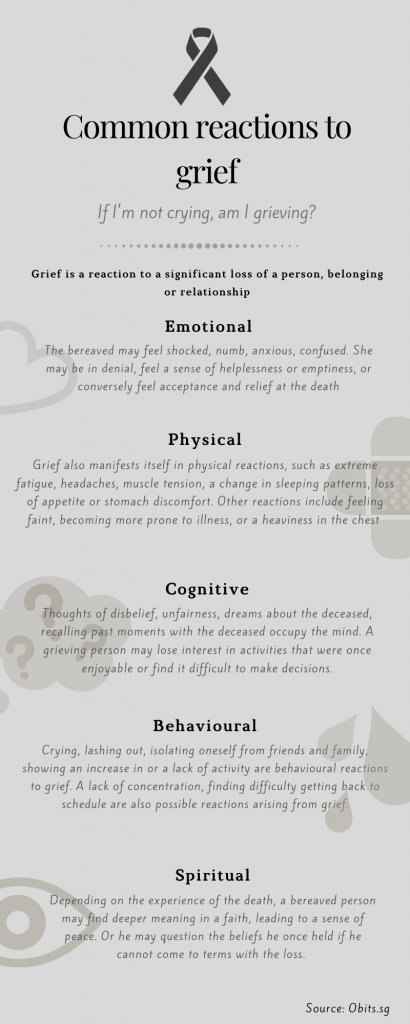Bereavement for one person can look different from another.
When you grieve, you are responding to the loss of someone or something significant to you.
The typical images of a grieving person are someone who is teary or sobbing uncontrollably. But our expressions of grief can take many different forms. There is no right or wrong way to grieve.
For some, they feel closure when recounting past instances to another person. Or they find solace in the deceased’s personal belongings. For others, their grief may take a physical form and they need to occupy themselves with activity.
Experts in counselling and grief therapy share that grieving does not follow a set pattern of behaviours and every individual will respond to a loss in their own unique way.
Why is the person in the front row crying more than me at a funeral
Some people are more emotional about loss and find an outlet in expressing their affections. They cry easily and may talk about their sadness or grief, recall past moments with the deceased or express themselves through journaling or other creative channels.
Others may not express themselves as readily. But they display their grief through action. They usually gather information, busy themselves with organising the funeral or memorial service, setting up a donation fund in the deceased person’s name or working on some other tasks.
Even if two different people who enjoyed the same close relationship with the deceased may grieve differently.
The ones who express emotions more readily are called intuitive grievers and those who occupy themselves with activity are identified as instrumental grievers. These ideas were first explored by Kenneth Doka and Terry Martin. Between these two styles of grieving is a continuum. Most of us display a mixture of types of behaviours that would fall between the two extremes.
The intensity of our grief can also be affected by some of the following factors:
- The circumstances of the death, ie, was the death violent, unexpected or did the death take place after a long illness
- Our personality
- Stressors that occur at the same time as the bereavement
- Our perspectives on life
- Historical experiences with loss
- Availability of support from family and external sources
(Adapted from Caring for yourself and others)
‘My mother just died, but I can’t seem to cry’
Grief is our reaction when the attachment we have with a person is broken. It can be caused by separation due to death, divorce or a break-up. As a result of the broken bond, we experience anxiety and may have difficulty understanding the loss. Our first reactions can range from immense sadness and emotional distress to physical pain and suffering.

The types of reactions we have towards grief can vary. Here are some of the more common reactions we may have during a period of grieving:
Emotional
- Anxiety
- Shock
- Confusion
- Anger
- Denial
- Numbness
- Helplessness
- Feelings of emptiness
- Acceptance
- Sense of relief
Physical
- Extreme fatigue
- Headache
- Muscle tension
- Changes in sleep patterns
- Loss of appetite
- Stomach discomfort
- Feeling weak
- More prone to illnesses
- Heaviness in chest and throat
Cognitive
- Disbelief
- Recalling moments and past experiences with the deceased
- Thoughts of unfairness
- Dreams about the deceased
- Loss of interest in activities previously enjoyed
- Short term memory loss
- Difficulty making decisions
Behavioural
- Bouts of crying
- Lack of ability to focus or concentrate on routine tasks
- Looking for reminders of the loved one
- Lashing out
- Isolating ourselves from friends and family
- Difficulty getting back to a regular schedule
- Heightened, or lack of, activity
- Becoming occupied with activities or loss of interest in activities previously enjoyed and withdrawing from interaction with other people
Sometimes, grief may spur a person to take up a cause to rectify a perceived injustice or wrong.
A recent example of grief stirring a cause is a group of mothers in Singapore who lost their children to suicide. They formed an advocacy group, PleaseStay, to raise support for mental wellness and suicide prevention among the youth. (The Straits Times, October 2019)
Grief can also inspire spiritual change. Depending on the life stage or the beliefs held by the bereaved, he may experience a deepening of the meaning of life in order to make sense of the death or conversely, may question a previously-held faith if there is no reconciliation to the loss.
How do I know if my grief is normal?
When the intense sadness or feelings of physical discomfort wear off, many may think that they are getting over their grief and life is getting back to an even keel, only to be hit by a bout of sadness when passing by a place that was frequently visited by the deceased, or coming across a personal belonging of the deceased when tidying a room.
Some people may take days to adjust, while others take weeks or months. While you adjust to the loss, be aware that life can become significantly different. Know that grief levels can ebb and flow, engendered by physical momentoes or even conversation with a third party that reminds you of the person who died.
As you adjust your routines and schedules, it is normal to experience days when you’re just not feeling good and other days when you are calm and peaceful.
Most people can cope with their grief without requiring extensive intervention or counselling. With enough familial and community support, they usually only need a comforting word that they’re doing ok.
When does grieving become not normal
If you find yourself unable to function at work, or in another role, being unable to help yourself in routine tasks after a prolonged period, and thoughts of self-harm creep in, thoughts of harming others, continued negative thoughts and feelings of guilt persist, then you may have trouble coping with grief.
This may be a good time to seek professional help.
Additional references that informed the writing of this article:
Kenneth Doka on Grief Counseling and Psychotherapy – https://www.psychotherapy.net/interview/grief-counseling-doka#section-defining-grief
Common Grief Reactions – https://www.hrrv.org/patients-caregivers/grief-support/common-grief-reactions/
The Ways We Grieve – https://www.psychologytoday.com/us/blog/the-truisms-wellness/201702/the-ways-we-grieve

